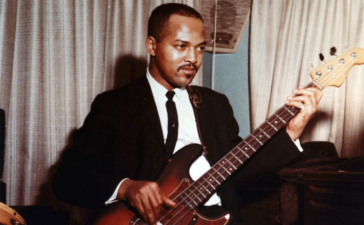Scott Ambush, born on April 28, 1960, in Frederick, Maryland, is an accomplished bassist best known for his role as the bassist for the legendary jazz fusion band Spyro Gyra. Over the course of his career, Ambush has become widely regarded for his technical proficiency, inventive bass lines, and ability to blend jazz, funk, and other genres seamlessly.
Early Life and Musical Beginnings
Scott Ambush grew up in a musical environment in Frederick, Maryland. His initial interest in music was influenced by a variety of genres, including soul, R&B, jazz, and classical music. He began playing bass at a young age, attracted to the instrument’s deep, resonant sound and its crucial role in rhythm sections. His early influences included jazz legends like Charles Mingus and Stanley Clarke, as well as funk and soul bassists like James Jamerson.
During his teenage years, Ambush quickly developed his skills on both the electric and acoustic bass, absorbing different musical styles and techniques. His eclectic taste in music and commitment to developing his craft set him apart as a young musician. He played in various local bands and jam sessions, where he honed his groove-oriented approach to the bass while exploring the instrument’s melodic potential.
College and the Pursuit of Jazz
Scott Ambush was born on April 28, 1960, in Frederick, Maryland, to his parents Webster and Jeanette Lofton Ambush. He went to Urbana Elementary School in Urbana, Maryland, followed by West Frederick Middle School and later Frederick High School. After graduating, he enrolled at the University of Maryland, College Park. While pursuing a degree in psychology during the day, he became involved with the Washington, D.C., music scene in the evenings.
Joining Spyro Gyra
In 1992, Scott Ambush joined Spyro Gyra, a band that had already gained international fame for its innovative jazz fusion sound. The band, founded by saxophonist Jay Beckenstein, blended jazz with pop, rock, funk, and world music influences, creating a sound that was accessible yet complex. Spyro Gyra’s music was rooted in improvisation but also featured polished, radio-friendly compositions.
Ambush’s entry into the band marked a significant turning point in his career. His bass playing, characterized by a balance of technical skill and musicality, quickly became an integral part of the band’s sound. His ability to create intricate yet accessible bass lines helped push the band’s evolving sound into new creative directions.
Key Albums with Spyro Gyra
During his time with Spyro Gyra, Scott Ambush has played on numerous albums, many of which have become jazz fusion staples. Some of his most notable recordings with the band include:
- “Three Wishes” (1992) – Ambush’s debut album with Spyro Gyra, this record features his ability to merge jazz with elements of funk and pop, immediately showcasing his talent for crafting complex, rhythmic bass lines.
- “Road Scholars” (1998) – A live album that captures the essence of Spyro Gyra’s improvisational style, Ambush’s bass work is a standout, demonstrating his skill in both solo and ensemble contexts.
- “The Deep End” (2004) – One of Spyro Gyra’s more critically acclaimed albums, Ambush’s playing on tracks like “Monsoon” and “Wiggle Room” highlight his mastery of jazz fusion and his ability to blend melodic and rhythmic sensibilities seamlessly.
- “Down the Wire” (2009) – This album features some of Ambush’s most creative work with Spyro Gyra, incorporating Latin, funk, and jazz influences into a cohesive, dynamic sound.
- “Vinyl Tap” (2019) – On this unique album, Spyro Gyra reinterprets classic rock and pop songs through a jazz fusion lens, and Ambush’s bass lines breathe new life into iconic tracks by artists like The Beatles and Cream.
Solo Work and Collaborations
In addition to his work with Spyro Gyra, Ambush has pursued solo projects that allow him to explore different musical landscapes. His solo work dives deeper into funk, fusion, and world music, and features his virtuosic playing and adventurous compositions. Although not as widely known as his work with Spyro Gyra, these projects offer a glimpse into Ambush’s broader artistic vision.
He has also collaborated with other notable musicians across various genres, including jazz, funk, and R&B. His session work and guest performances demonstrate his ability to adapt his playing to different musical contexts, further solidifying his reputation as a versatile and sought-after bassist.
Educational Contributions
While Ambush has not authored traditional instructional books or formal publications, his contributions to bass education are significant. He has held numerous bass clinics and masterclasses, sharing his knowledge with aspiring bassists around the world. His teaching emphasizes both the technical and musical aspects of bass playing, focusing on groove, harmonic understanding, and personal expression.
Ambush often discusses the importance of developing one’s own voice on the instrument, encouraging students to explore various styles while maintaining a focus on musicality. His emphasis on the balance between technical precision and emotional expression has inspired countless bass players to push the boundaries of the instrument.
Influence and Legacy
Scott Ambush’s impact on the world of jazz fusion and bass playing is profound. His work with Spyro Gyra has introduced jazz fusion to new audiences and continues to inspire both musicians and fans alike. Ambush’s ability to blend technical skill with groove, melody, and innovation has made him a standout figure in the bass community.
Beyond his musical accomplishments, Ambush’s dedication to education ensures that his influence extends to the next generation of bassists. His legacy is not only in the music he has created but also in the musicians he has inspired along the way.
Conclusion
Scott Ambush’s career as a bassist is defined by his versatility, technical prowess, and musicality. From his early days as a budding musician in Maryland to his decades-long tenure with Spyro Gyra, Ambush has left an indelible mark on the world of jazz fusion. His contributions to music, both as a performer and educator, will continue to resonate with bass players and jazz enthusiasts for years to come, solidifying his place as one of the most influential bassists of his generation.









